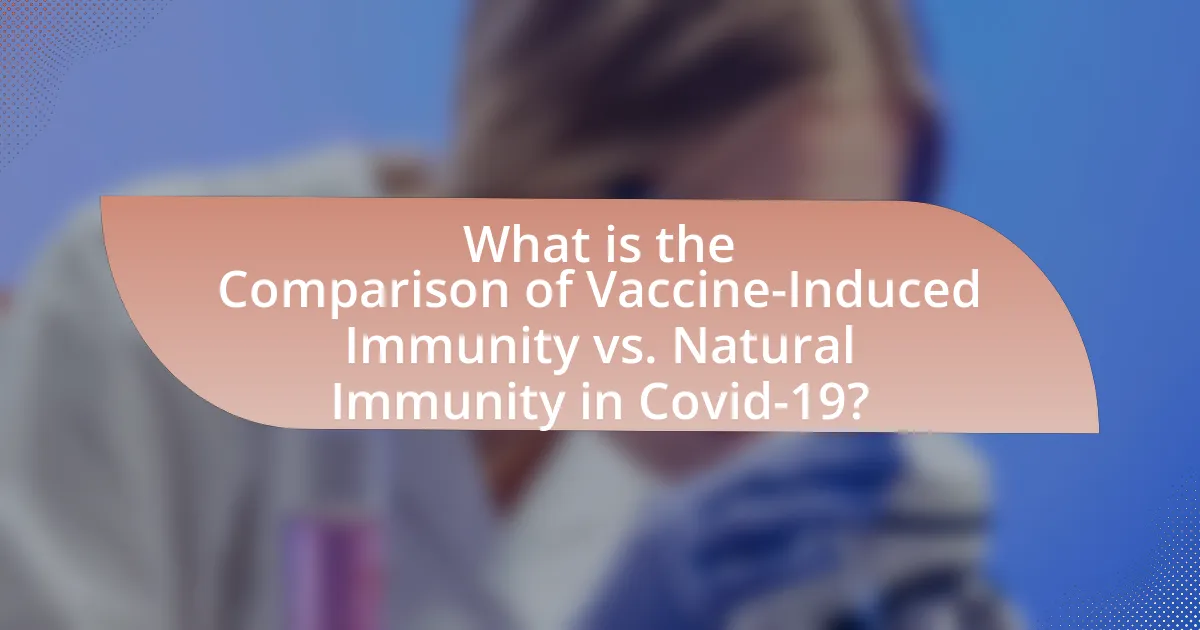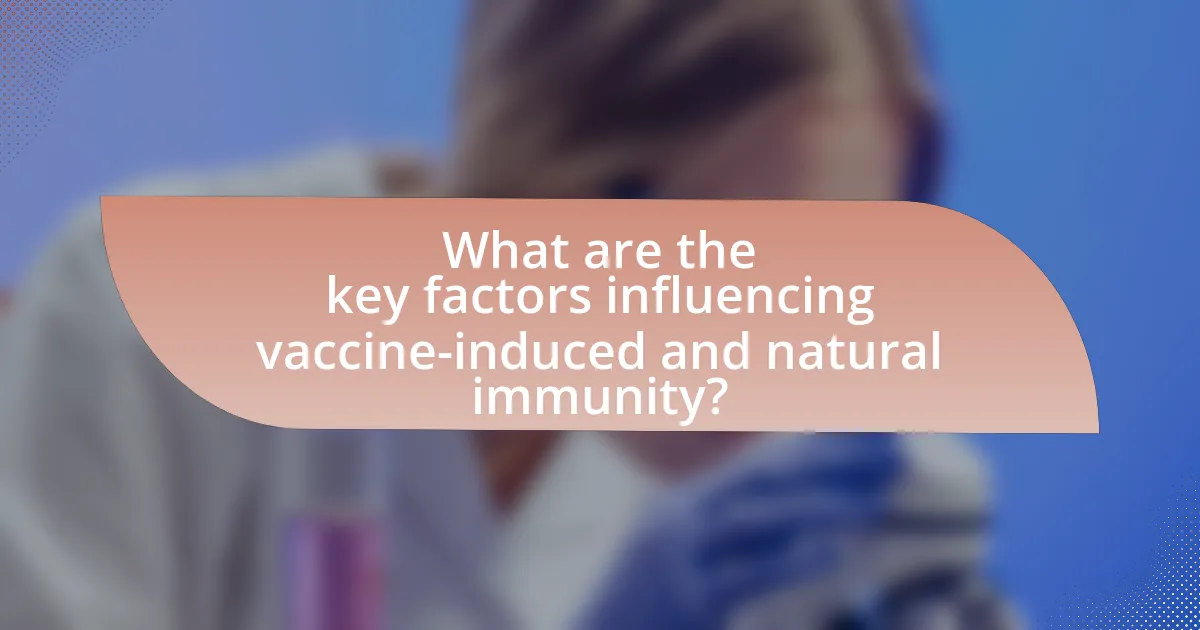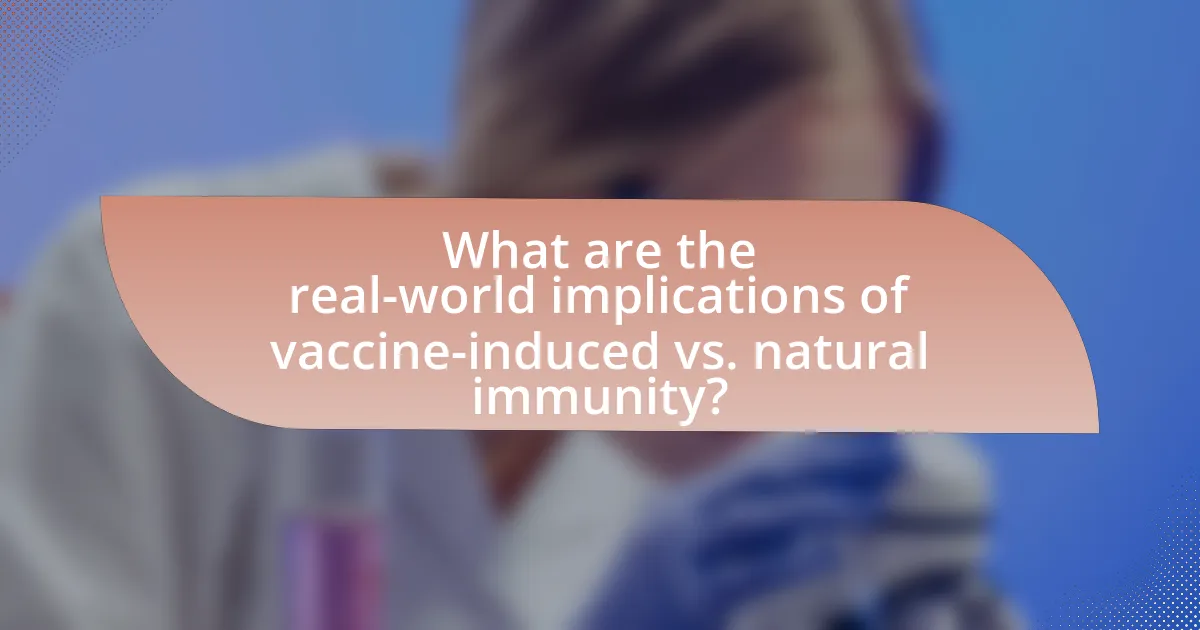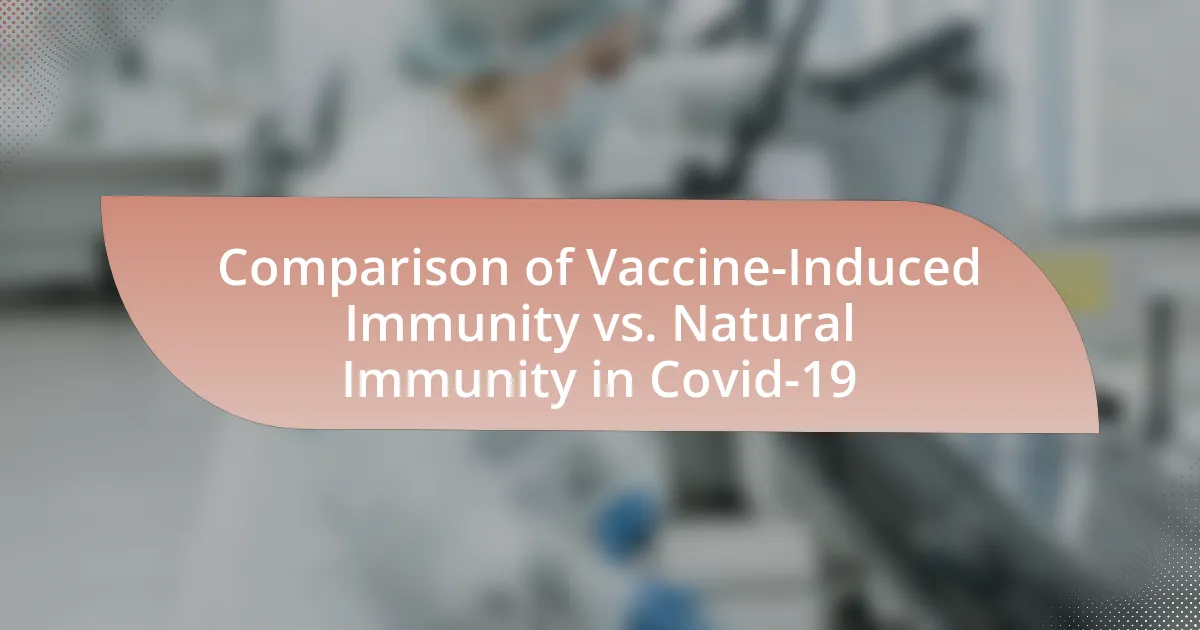The article examines the comparison between vaccine-induced immunity and natural immunity in the context of COVID-19, highlighting their distinct mechanisms and effectiveness. Vaccine-induced immunity, generated through vaccination, typically elicits a more predictable and robust immune response, particularly against emerging variants, while natural immunity arises from prior infection and can vary in strength and durability. Key factors influencing both types of immunity include age, health status, and the presence of viral variants, which can affect overall protection and transmission rates. The article emphasizes the importance of vaccination for enhancing immunity and informs public health policies and individual health decisions regarding COVID-19.

What is the Comparison of Vaccine-Induced Immunity vs. Natural Immunity in Covid-19?
Vaccine-induced immunity and natural immunity in COVID-19 differ in their mechanisms and effectiveness. Vaccine-induced immunity is generated through the administration of vaccines, which stimulate the immune system to produce antibodies and memory cells without causing the disease. Studies, such as one published in the journal “Nature” by Wang et al. (2021), indicate that mRNA vaccines like Pfizer-BioNTech and Moderna elicit strong antibody responses and T-cell activation, providing robust protection against severe disease and hospitalization.
In contrast, natural immunity develops after infection with the virus, leading to the production of antibodies and immune memory. Research published in “The New England Journal of Medicine” by Abu-Raddad et al. (2021) shows that natural immunity can provide strong protection, but its durability and effectiveness against variants may vary.
Overall, while both types of immunity offer protection, vaccine-induced immunity is generally more predictable and consistent, especially against emerging variants, whereas natural immunity can be variable and may not provide sufficient protection against reinfection.
How do vaccine-induced immunity and natural immunity differ?
Vaccine-induced immunity and natural immunity differ primarily in their mechanisms of activation and the duration of protection. Vaccine-induced immunity is generated through the administration of a vaccine, which introduces an antigen that stimulates the immune system to produce a targeted response without causing disease. In contrast, natural immunity develops after an individual is infected with a pathogen, leading to a more complex immune response that includes memory cells specific to the pathogen. Studies indicate that while natural immunity can provide strong protection, vaccine-induced immunity is designed to elicit a more consistent and predictable immune response, often leading to enhanced protection against variants. For example, research published in the journal “Nature” found that mRNA vaccines, like those from Pfizer and Moderna, produce higher levels of neutralizing antibodies compared to natural infection, suggesting a more robust immune response.
What are the mechanisms behind vaccine-induced immunity?
Vaccine-induced immunity primarily operates through the activation of the adaptive immune system, specifically by stimulating the production of antibodies and the generation of memory cells. Vaccines introduce antigens, which are components of pathogens, into the body, prompting the immune system to recognize and respond to these foreign substances. This process involves the activation of B cells, which produce antibodies that neutralize pathogens, and T cells, which help in identifying and destroying infected cells.
Research has shown that mRNA vaccines, such as those developed for COVID-19, effectively elicit a robust immune response by encoding the spike protein of the virus, leading to the production of specific antibodies and T cell responses. A study published in the journal Nature by Polack et al. (2020) demonstrated that the Pfizer-BioNTech vaccine induced strong antibody responses and T cell activation, confirming the effectiveness of this mechanism in establishing immunity.
What are the mechanisms behind natural immunity?
Natural immunity is primarily mediated through the body’s innate and adaptive immune responses. The innate immune response acts as the first line of defense, utilizing physical barriers, phagocytic cells, and inflammatory mediators to recognize and eliminate pathogens. Following this, the adaptive immune response is activated, involving T cells and B cells that specifically target and remember pathogens. For instance, memory T cells can quickly respond to previously encountered viruses, while B cells produce antibodies that neutralize pathogens. Studies have shown that individuals recovering from COVID-19 develop robust antibody responses and T cell memory, which contribute to long-lasting immunity against reinfection.
Why is understanding this comparison important?
Understanding the comparison between vaccine-induced immunity and natural immunity in COVID-19 is crucial for public health decision-making and individual health choices. This comparison informs vaccine development, guides vaccination strategies, and shapes policies aimed at controlling the pandemic. For instance, studies have shown that vaccine-induced immunity can provide a more consistent and robust response against variants compared to natural immunity, which may vary significantly among individuals. Understanding these differences helps healthcare professionals recommend appropriate vaccination schedules and booster shots, ultimately leading to better protection for the population.
How does this comparison impact public health policies?
The comparison of vaccine-induced immunity versus natural immunity in COVID-19 significantly impacts public health policies by informing vaccination strategies and public health messaging. Evidence indicates that vaccine-induced immunity generally provides a more robust and consistent level of protection against severe disease compared to natural immunity, which can vary widely among individuals. For instance, studies have shown that vaccinated individuals have a lower risk of hospitalization and death compared to those relying solely on natural immunity. This data influences policymakers to prioritize vaccination campaigns, allocate resources effectively, and develop guidelines that encourage vaccination even among those who have recovered from COVID-19. Consequently, public health policies are shaped to enhance community immunity and reduce the overall burden of the disease.
What implications does this have for individual health decisions?
The comparison of vaccine-induced immunity versus natural immunity in COVID-19 has significant implications for individual health decisions. Individuals may choose vaccination over relying solely on natural immunity, as studies indicate that vaccine-induced immunity can provide more robust and longer-lasting protection against severe disease and hospitalization. For instance, research published in the journal “Nature” by Abu-Raddad et al. (2021) found that vaccinated individuals had a lower risk of reinfection compared to those who were previously infected with the virus. This evidence suggests that individuals should consider vaccination as a critical component of their health strategy, especially in the context of emerging variants and waning immunity.

What are the key factors influencing vaccine-induced and natural immunity?
The key factors influencing vaccine-induced and natural immunity include the type of pathogen, the immune response elicited, and the duration of immunity. Vaccine-induced immunity typically involves a controlled exposure to antigens, leading to a robust and targeted immune response, while natural immunity arises from actual infection, which can vary in strength and duration based on the individual’s health and the pathogen’s characteristics. Studies have shown that vaccine-induced immunity can provide a more consistent and predictable level of protection compared to natural immunity, which may be influenced by factors such as viral load during infection and pre-existing health conditions. For instance, research published in the journal “Nature” by Hall et al. (2021) demonstrated that mRNA vaccines elicited higher antibody levels than those found in individuals who had recovered from COVID-19, indicating a stronger and more reliable immune response from vaccination.
How do age and health status affect immunity types?
Age and health status significantly influence the types of immunity individuals develop. Older adults typically exhibit a decline in immune function, known as immunosenescence, which reduces the effectiveness of both vaccine-induced and natural immunity. For instance, studies show that individuals over 65 years have a weaker antibody response to vaccines compared to younger populations, leading to lower protection levels against infections like COVID-19. Additionally, individuals with chronic health conditions, such as diabetes or heart disease, often experience impaired immune responses, making them more susceptible to severe illness and less responsive to vaccines. Research indicates that these factors can lead to a higher incidence of breakthrough infections in older adults and those with compromised health, highlighting the critical role of age and health status in shaping immunity types.
What role does age play in vaccine response?
Age significantly influences vaccine response, with older adults typically exhibiting a weaker immune response compared to younger individuals. Research indicates that immunosenescence, the gradual deterioration of the immune system associated with aging, leads to reduced antibody production and lower efficacy of vaccines in older populations. For instance, studies have shown that individuals over 65 years old often have a diminished response to COVID-19 vaccines, resulting in lower antibody levels and less robust T-cell activation compared to younger cohorts. This age-related decline in immune function underscores the necessity for tailored vaccination strategies and booster doses for older adults to enhance their protective immunity against infections like COVID-19.
How does underlying health affect natural immunity?
Underlying health significantly influences natural immunity by affecting the body’s ability to respond to infections. Individuals with chronic conditions such as diabetes, obesity, or cardiovascular diseases often exhibit a weakened immune response, which can diminish the effectiveness of natural immunity against pathogens like the virus causing COVID-19. Research indicates that these underlying health issues can lead to increased susceptibility to infections and poorer outcomes, as evidenced by studies showing that patients with comorbidities experience more severe symptoms and complications from COVID-19. For instance, a study published in the Journal of the American Medical Association found that patients with obesity had a higher risk of hospitalization and severe illness from COVID-19, highlighting the critical role of underlying health in shaping immune responses.
What are the roles of variants in immunity effectiveness?
Variants play a significant role in immunity effectiveness by altering the virus’s structure, which can impact how well the immune system recognizes and responds to it. For instance, variants like Delta and Omicron have shown increased transmissibility and the ability to partially evade neutralizing antibodies generated by both vaccines and natural infections. Studies indicate that these variants can lead to reduced vaccine efficacy, as seen in research published in the New England Journal of Medicine, which reported a decrease in vaccine effectiveness against symptomatic infection with the Delta variant. Additionally, the emergence of variants can necessitate updates to vaccines to maintain their effectiveness, highlighting the dynamic relationship between viral evolution and immune response.
How do variants impact vaccine efficacy?
Variants can significantly reduce vaccine efficacy by altering the virus’s spike protein, which is the primary target of most COVID-19 vaccines. For instance, studies have shown that variants like Delta and Omicron exhibit mutations that enable them to partially evade neutralizing antibodies generated by vaccines. Research published in the New England Journal of Medicine indicated that vaccine effectiveness against symptomatic infection dropped from approximately 95% for the original strain to around 60% for the Delta variant and even lower for Omicron. This reduction in efficacy underscores the importance of ongoing vaccine updates and booster shots to enhance protection against emerging variants.
What is the effect of variants on natural immunity?
Variants of the virus can significantly impact natural immunity by altering the virus’s structure, which may allow it to evade immune responses generated from previous infections. Studies have shown that certain variants, such as the Delta and Omicron variants, exhibit mutations that reduce the neutralizing ability of antibodies produced from prior infections, leading to increased susceptibility to reinfection. For instance, research published in the journal Nature in 2021 indicated that the Omicron variant had a substantial ability to escape neutralization by antibodies from individuals who had recovered from earlier strains of the virus. This suggests that while natural immunity provides some level of protection, its effectiveness can be compromised by the emergence of new variants.

What are the real-world implications of vaccine-induced vs. natural immunity?
Vaccine-induced immunity generally provides a more predictable and robust response against COVID-19 compared to natural immunity, which can vary significantly among individuals. Studies indicate that vaccinated individuals have a lower risk of severe illness, hospitalization, and death from COVID-19, even in the face of variants, due to the targeted immune response generated by vaccines. For instance, research published in the New England Journal of Medicine shows that mRNA vaccines reduce the risk of symptomatic infection by approximately 94% and severe outcomes by over 90%. In contrast, natural immunity, while effective, may not consistently offer the same level of protection, particularly against variants, as evidenced by data from the CDC indicating that reinfections can occur in previously infected individuals. Therefore, the real-world implications highlight that vaccination is crucial for achieving broader and more reliable community immunity, reducing overall transmission rates, and protecting vulnerable populations.
How do these immunity types affect transmission rates?
Vaccine-induced immunity and natural immunity significantly affect transmission rates of COVID-19. Vaccine-induced immunity generally leads to a lower viral load in vaccinated individuals, which reduces the likelihood of transmission compared to those with natural immunity, who may carry higher viral loads during infection. Studies have shown that vaccinated individuals are less likely to spread the virus, with research indicating that mRNA vaccines can reduce transmission by approximately 66% compared to unvaccinated individuals. In contrast, natural immunity may provide some level of protection but is often associated with variable viral loads and increased transmission risk, particularly in cases of reinfection. Thus, vaccine-induced immunity is more effective in lowering transmission rates than natural immunity.
What evidence exists regarding transmission from vaccinated individuals?
Evidence indicates that vaccinated individuals can still transmit SARS-CoV-2, albeit at lower rates compared to unvaccinated individuals. Studies, such as one published in the journal Nature in 2021, found that fully vaccinated individuals who contracted breakthrough infections had viral loads similar to those of unvaccinated individuals, suggesting potential for transmission. Additionally, research from the CDC in 2021 showed that vaccinated individuals could still spread the virus, particularly with the emergence of variants like Delta. These findings underscore that while vaccines significantly reduce the risk of severe illness and hospitalization, they do not completely eliminate the possibility of transmission.
How does natural immunity influence the spread of Covid-19?
Natural immunity influences the spread of Covid-19 by providing individuals with a degree of protection against reinfection, which can reduce transmission rates within communities. Studies have shown that individuals who have recovered from Covid-19 often develop antibodies that can neutralize the virus, contributing to a lower likelihood of spreading it to others. For instance, research published in the journal “Nature” indicates that natural immunity can last for several months, with some studies suggesting it may be comparable to vaccine-induced immunity in terms of preventing severe disease and hospitalization. This immunity can lead to a decrease in the overall number of cases, thereby influencing the dynamics of the virus’s spread in the population.
What are the recommendations for individuals based on immunity type?
Individuals with vaccine-induced immunity are recommended to receive booster shots as per public health guidelines to enhance and prolong their immune response against COVID-19. This recommendation is based on studies indicating that vaccine-induced immunity may wane over time, necessitating additional doses to maintain protection levels.
Conversely, individuals with natural immunity, acquired through previous COVID-19 infection, are advised to consult healthcare professionals regarding vaccination. Research suggests that while natural immunity can provide significant protection, vaccination may further enhance this immunity and offer broader coverage against variants.
The Centers for Disease Control and Prevention (CDC) supports these recommendations, emphasizing the importance of vaccination for both groups to achieve optimal immunity and community protection against COVID-19.
What precautions should vaccinated individuals take?
Vaccinated individuals should continue to practice precautions such as wearing masks in crowded or indoor settings, maintaining physical distance from others, and regularly washing hands. These measures help reduce the risk of breakthrough infections and transmission, even among those who are vaccinated. Studies indicate that while vaccines significantly lower the risk of severe illness, they do not eliminate the possibility of infection entirely, particularly with emerging variants. For instance, research published in the New England Journal of Medicine highlights that vaccinated individuals can still carry and transmit the virus, underscoring the importance of ongoing preventive behaviors.
What should individuals with natural immunity consider for protection?
Individuals with natural immunity should consider vaccination for enhanced protection against COVID-19. Research indicates that while natural immunity provides some level of defense, vaccination can significantly boost antibody levels and broaden the immune response. A study published in the journal “Nature” by Abu-Raddad et al. (2021) found that individuals with prior infection who received a single dose of the vaccine had a much lower risk of reinfection compared to those relying solely on natural immunity. Therefore, vaccination serves as a critical complement to natural immunity, offering improved protection against variants and potential reinfection.
What best practices should individuals follow regarding immunity in Covid-19?
Individuals should prioritize vaccination as the best practice for enhancing immunity against Covid-19. Vaccines, such as those developed by Pfizer-BioNTech and Moderna, have shown efficacy rates exceeding 90% in preventing severe illness and hospitalization. Additionally, individuals should maintain a healthy lifestyle, including a balanced diet, regular exercise, and adequate sleep, which can support overall immune function.
Research indicates that vaccinated individuals have a lower risk of severe outcomes compared to those relying solely on natural immunity from previous infections. For instance, a study published in the New England Journal of Medicine found that vaccine-induced immunity provides a stronger and more consistent response than natural immunity alone. Therefore, following vaccination guidelines and adopting a healthy lifestyle are essential best practices for individuals regarding immunity in Covid-19.


